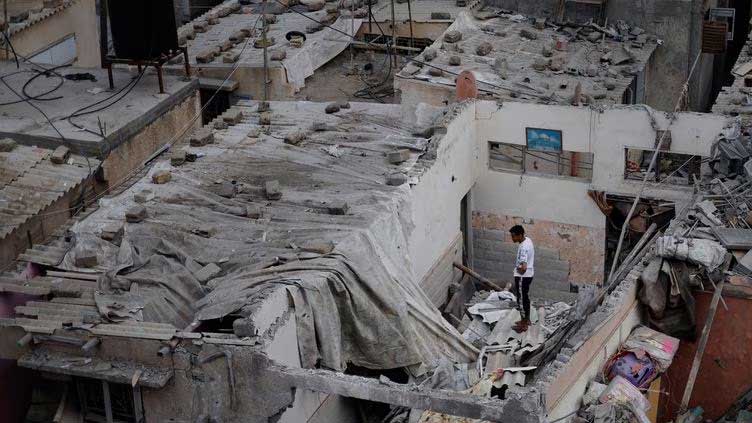Bombarded Gazans seek news of loved ones as blackout eases

World
Bombarded Gazans seek news of loved ones as blackout eases
GAZA (Reuters) - Gazans struggled to find their loved ones and heard news of family members killed as communications gradually returned to the enclave on Sunday after a near total blackout as Israel's troops and armour pushed into the Hamas-ruled enclave.
The United Nations also warned that Palestinians were desperate for food and that civil order was breaking down after three weeks of war with Hamas militants and a siege on the densely populated coastal strip.
The fighting intensified on Friday night as Israeli forces waged ground operations in Gaza in what Israeli Prime Minister Benjamin Netanyahu described as the second phase of the war aimed at crushing Hamas.
Shaban Ahmed, a public servant who works as an engineer and has five children, described the Israeli attacks as "doomsday".
"This morning, Sunday, I discovered that my cousin has been killed in an air strike on their house on Friday," Ahmed, who stayed in Gaza City despite an Israeli warning to evacuate south, told Reuters.
"We only knew today. Israel cut us off from the world in order to wipe us out, but we are hearing the sounds of explosions and we are proud the resistance fighters have stopped them at meters distance."
Israel's chief military spokesperson has declined to say whether Israel had been behind the telecommunications blackout but said it would do what it needed to protect its forces.
Israeli air strikes have been pounding Gaza City since Hamas' Oct. 7 attack on southern Israel, in which Israeli authorities said at least 1,400 Israelis were killed in the deadliest day of the nation's 75-year history.
Ahmed said the strikes on Friday from air, sea and the ground continued non-stop for hours.
Hamas said on Sunday it was continuing to confront Israeli forces, which were continuing ground operations.
The health ministry in Gaza said on Sunday a total of 8,005 people there had been killed since Oct. 7.
CIVIL ORDER
Palestinians were struggling to find loved ones in the bloody chaos as the growing humanitarian crisis squeezed Gaza. One woman looking for one of her sons stood over rubble in Gaza City and cried out: "I don't know where he is."
Many people have been glued to rusty radios for news, which had become the only means to get information on the heaviest Israeli air strikes ever on narrow Gaza, one of the most densely populated spots in the world, with the internet and phones down.
Medical services became so stretched that ambulances were no longer taking calls. People hit by bombings relied on volunteers to take them for treatment.
The air strikes focused heavily on areas in northern Gaza, including Gaza City, where ground incursions were taking place.
People in the southern Gaza Strip heard the explosions, and saw the sky light up - but had no means of checking on family and friends in the targeted areas.
“Gaza is isolated from the rest of the world. Strikes are hitting right next to us, around us and no one can reach us or locate the strike," said Gaza resident Um Yehia, who went south after the Israel warning and is now sheltering inside the Nasser Hospital in Khan Younis.


